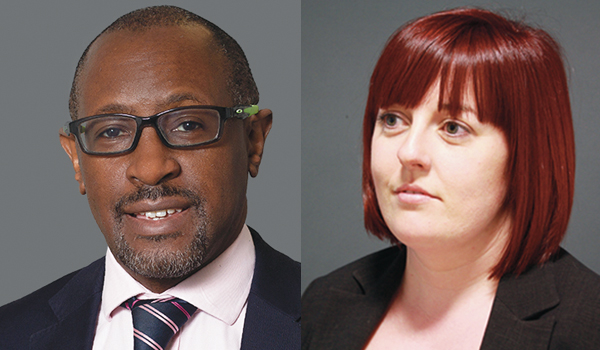Do we still need jury trials?
The massive backlog in court cases due to the coronavirus pandemic has led to some to suggest trials should be held without juries to speed up the legal process. Barrister Twanieka Alcindor explores the role of juries in the criminal justice system and the examines the evidence for and against abolition.
The ‘trial by 12 good men’ was used for the first time in Westminster in 1220, however no one truly knows when the link between 12 men on oath and criminal justice began, with some historians believing it dates back to a 9th century agreement between King Alfred and the King of Denmark. Regardless of when they first started being used, juries have played a central part of the English legal system for hundreds of years.
Lord Devlin famously declared the jury to be “the lamp that show’s freedom lives”, but does the suggested abolition of juries mean that freedom as we know it no longer lives?
The jury has long been described as having three key functions: Firstly, to decide the facts and upon those facts determine guilt. Secondly, to add certainty to the law and giving a verdict without reasons. And finally, to represent the just face of the criminal justice system, since it can arrive at its unchallengeable decision on any basis it chooses.
Judgment of one by his peers or jury service is widely accepted as an important public duty, one that many British citizens take pride in; when they do their bit to help further the administration of justice.
In the UK jury trials are reserved for the most serious cases. In cases where there are suspected or evidenced interference with juries part 7 of the Criminal Justice Act (2003) provides that a judge only trial may be ordered. Examples of the extreme last-resort circumstances that have resulted in a judge only trial or a jury being discharged and continuing judge only are in the case of Momodu [2005] CA (Crim Div) and Orgles [1994] 98 Cr. App. R. 185.
My first exploration of non-jury trials came about in 2012 when I was a law student assisting on a multi-handed gang related murder trial at the Central Criminal Court. The case involved legal argument and consideration on whether the jury should have been discharged. The then (now retired) trial judge gave the jury the following direction “you took an oath or affirmation to fairly, impartially and collectively try the case on the evidence…an oath which means you must act together in the interests of public justice in order to return true and proper verdicts”.
This direction like many others given to juries around the country highlights their wider, more general function “to act together in the interests of public justice”.
Right to a fair trial
It is of note that Article 6 of the European Convention on Human Rights (ECHR) requires a trial by an independent and impartial tribunal established by law. There is nothing in this statute which states that a judge only trial automatically renders a trial unfair. An obvious argument exists that society holds both hope and confidence that a judge who acts unfairly or in breach of the ordinary rules of judicial conduct would have such decisions reconsidered or quashed by the appeal courts.
There is, however, an opposing argument that if it is established on appeal that a witness was lying or the evidence was false and the judge gave credit or weight to this which is subsequently overturned on appeal that this would hinder the public’s belief in the judiciary.
Article 6 is fundamental to the rule of law and democracy. It is an absolute right to be presumed innocent until proven guilty, and the jury are to consider their verdicts on the evidence presented to them.
The debate
In a judge only trial a judge is given all the powers of a jury but must give reasons for their decision. By stark comparison, a jury does not have to give any reasons for their verdict at all. This mystery means that even in a case where the lawyers, the judge and witnesses are convinced one-way or another of an outcome, the jury can decide completely differently without ever providing any reasons for their decision.
There has been much debate that experienced judges are better suited to deal with complex cases involving voluminous documentary evidence, which the average juror would supposedly struggle to get to grips with, for example, in complex fraud matters. However, with the ever-increasing development of technology and increased amounts of digital data that is available in this day and age, what is there to say that less serious offences may not become more complex or involve larger amounts of documentary evidence in the years to come?
‘Diplock Trials’
In 1973 the controversial ‘Diplock Trials’ were introduced and used a single judge rather than a jury in around one third of all serious criminal cases in Northern Ireland. While procedural changes were made to facilitate this change, for example, the introduction of an automatic right to appeal and the requirement that judges had to provide reasons for their decisions, critics of the Diplock Trials have expressed their appearance as the Government’s “temptation in times of social turmoil to resort to measures of an extreme nature”.
Diplock trials were used in more than 300 cases a year in Northern Ireland at one point, however, they were eventually abolished in 2007, now only being used for terrorist related cases.
The suggestion of Diplock trials re-introduction in Northern Ireland has come with much criticism, Geoffrey Robertson QC stating that “we should not seek to revisit a system that restricts the right of defendants to trial by jury of their peers in the interests of administrative speed”.
As recently as 2019 a former British soldier Dennis Hutchings had an appeal against the decision to try him in a Diplock court for an offence committed in 1974 before the Supreme Court, some 45 years later. That appeal was unsuccessful but is evidence of the continued concern that arises where the availability of a jury trial has been removed.
Thirty eight years after the introduction of Diplock trials, the then Lord Chief Justice, Lord Judge issued a warning of “the need to preserve the integrity of jury trials and the jury system”. The suggestion that jury trials should be replaced with judge only trials is not a new one, and there has always been opposition.
Between 1999 and 2000, the UK Government made two abortive attempts to abolish the defendant’s right of election for a jury trials in either way cases. LJ Auld then made recommendations for the creation of an intermediate court with a bench consisting of a District Judge and two lay magistrates. The Government rejected these recommendations.
The then Select Committee on Home Affairs stated that they believed “the right to trial by jury should be preserved unless there are cogent reasons for ordering a trial without a jury”. The Government’s response was much more specific, they stated that “they sought to uphold one of the principles of the justice system”, which is that serious crimes should normally be tried by juries.
That was 20 years ago.
So what has changed since then? Why are we again considering whether we should abolish jury trials in 2020?
It is accepted that technology has significantly developed. Indeed, lawyers and judges across the world have adapted to remote video and telephone hearings due to Covid-19 restrictions and court closures. This has been a welcomed adjustment by many UK barristers who have found themselves able to accept more work, spend less time commuting cross country, having reduced travel expenses (which are frequently in the hundreds of pounds each week), having more time to spend with family, preparing their busy caseloads at reasonable hours of the day and night and finally eating lunches which do not consist of a squashed home-made sandwich retrieved from the bottom of their heavy bags.
Many lawyers are in favour of remote hearings continuing long after lockdown for preliminary and non-custodial matters. I mean why would anyone want to travel from Croydon to Manchester and back again in a single day if it can be avoided?
Further changes since the year 2000 have been the increasing court closures and legal aid cuts. Many court buildings have been closed, and a good number of those which remain do so in terrible states of disrepair. It is also impossible to ignore the many courtrooms that have been sitting empty of judge’s availability to hear cases. In 2018/19, only 160 of the initial 250 recorder vacancies were filled due to the Ministry of Justice decision to restrict the number of judges sitting in courts nationwide.
This left many courts without sufficient judicial time to deal with cases and it is no wonder that the courts were unable to adjust quickly to continue live hearings permitting for social-distancing in many court buildings during the Covid-19 crisis.
Additionally, significant legal aid cuts throughout the profession and particularly in the criminal justice division have meant that even before the Covid-19 crisis the backlog of criminal trials had reached 37,500 cases in December 2019. This number has steadily grown since the implementation of lockdown court closures and with only a small percentage of crown courts having resumed jury trials recently the hopes of clearing the ever-increasing backlog is nowhere near in sight.
This is clear evidence that the public purse is already stretched beyond its limits, (and I shall not even begin to mention the effects that this has on legal aid lawyers, with over 120 criminal law firms having collapsed within the last year and fees for defence practitioners not having been increased in cash terms for 25 years), but are these good enough reasons to scrap jury trials?
Are judge only trials the way to fix the problem?
To remove jury trials may save some much-needed money; in 2012, reform proposals to scrap jury trials in minor triable either-way cases were argued to save the country £30 million a year. Yes, the criminal justice system could do with some money, if not to help repair the leaky roofs in many courts alone, including the Central Criminal Court. There is an argument that judge-only trials risks further eroding the confidence the public has in the criminal justice system which promotes as a fundamental principle that justice must not only be done but also be seen to be done.
Can our experienced judges, many of which spent many years prosecuting and defending thousands of cases in their early careers really be as representative of society as 12 randomly selected jurors? Judicial statistics show that last year of 873 Recorder Judges in the UK only 24 were black and of 127 District Judges in the magistrates’ court, there were only eight black persons appointed.
The highest percentage of black judges were 13 per cent of Deputy High Court Judges. The most recent government statistics show that across England and Wales a black person is ten times more likely than a white person to be stopped and searched and BAME (black, Asian and minority ethnic) individuals have an overall higher rate of prosecution. While the judiciary’s diversity has grown over recent years, it is still a long way off being better reflective of those who are passing through its courts.
Baroness Shami Chakrabarati, former head of Liberty, once said that “without juries justice could come to seem like the professional classes in permanent judgment over ordinary people”.
Arguably, the ordinary person to many defendants is the man on the Clapham omnibus, rather the male, white, middle-classed, Oxbridge or Russell group educated judge in the courtroom. Defendants continue to frequently take their chances with 12 random people, from 12 walks of life, with 12 different life experiences over a single judge or magistrates when they are facing custodial sentences. Who can blame them?
A widely discussed alternative to the removal of jury trials is the introduction of a reduced jury panel of seven. It is thought this alternative model could both assist with the preservation of a defendant’s right to trial by a jury and help clear the growing backlog of jury trials while facilitating the need to ensure safe social distancing in our courtrooms. The suggestion that judge-only trials will be temporary measure is considered with much cynicism given that the Diplock trials, which were introduced as a temporary measure, remained in place for 34 years.
It is not the only time when measures have been introduced temporarily as an impingement of fundamental rights in a time of ‘public emergency’ that go on far longer than expected.
Can we avoid physically going to court for trials post covid-19?
As a black female barrister from a working-class background, I represent people like myself, with backgrounds and childhoods like mine, every single day in both the criminal and family courts. I use my life experience in the court room to appeal to the varied life experiences of jurors. My tone of voice, body language and even down to what hair style or shoes I wear on speech day and every time I pretend to shuffle papers or glance at my notes, keeping the courtroom on tenterhooks, impact my delivery and performance, daily.
This does not mean that I have no faith in the present system but without a jury that faith diminishes, it presents as the state vs the person and whether we wish to accept it or not a judge who has heard hundreds or thousands of defendants say ‘I was selling cocaine to feed my habit or to pay off a debt with my dealer’ will no doubt think ‘where have I heard this old story before?’
Judges in all their impartiality and independence are human beings, they too, over time can become case hardened. The beauty of a jury is the very reason it was introduced in the first place. Trial by one’s peers. In all their variety and randomly selected This is because they are more likely to have shared some life experiences with the defendant, witness or even prosecutor, and less likely to have shared experiences with many judges or magistrates.
What does the average judge know about stealing to feed their family? Or being stopped and searched for a ‘routine check’ when you are a young black male driving a car that is considered ‘expensive’ by the police who passed you at the last traffic light? They are unlikely to have direct experience of this. One of the 12 jurors, however, might or might know someone who has those shared experiences.
The separation of the tribunals of fact and law remains important and easily demonstrated when you compare the practice of legal evidence and procedure in magistrates and crown courts. In the magistrates court, they hear applications to exclude evidence, frequently refuse said application, and you are occasionally able to hear the weight they unduly place upon it when they later convict and provide their reasons for doing so.
In the Crown Court the jury are absent during potentially legal argument and everyone continues as if nothing has happened effectively ‘what the jury do not know cannot hurt them’. A question to consider is whether a judge is truly able to put matters he or she has been told have no weight or relevance to the back of his or her mind or later be convinced that the same evidence they have been asked to exclude has more weight than it did a few hours before? Further, if mistakes are made what happens to the judge’s ongoing credibility?
Forward thinking
Whilst we can use the developed technology to help move cases forward, and prevent a further backlog with mention hearings and case management continuing to take place remotely after lock down, juries are important, they support the fair administration of justice, and most importantly people believe that they are fair. Covid-19 is not a good enough excuse to scrap them. We must all be wary of the removal of our freedoms in the name of an emergency situation.
Ultimately, even with remote hearings continuing or changes to juries being present in court for trials, juries should ‘see the whites of a witnesses eyes’, and be permitted to take from a witnesses demeanour and body language, every smirk, every glance towards the dock that they see fit; this cannot be properly achieved without live evidence and better still, live jurors.
Nevertheless, it is widely agreed throughout the legal profession that whatever the temporary measures that are introduced, a significant cash injection to the criminal justice system is desperately needed in the longer term to revive the system that was already on its knees prior to the pandemic.
In conclusion, irrespective of the amount of money it may save to get rid of juries, the clear experience, independence and impartiality of our judiciary and the appeal courts who are waiting to put any mistakes right, I shall continue to advise my clients to carefully consider electing for a jury trial, I mean 12 heads are better than one, or at least that’s how I remember the saying. (If I am wrong, perhaps the 11 other jurors can help me change my mind).
Twanieka Alcindor is a barrister at 2 Dr Johnson’s Buildings specialising in criminal and family law. In 2014 she founded a pro-bono organisation in Lambeth, south London, named ‘Lawyers in the Soup Kitchen’, and qualified as an Attorney-at-Law in the Commonwealth Caribbean island of Jamaica. Prior to joining chambers, she gained several years of experience working as a paralegal, police station accredited representative and legal consultant.





